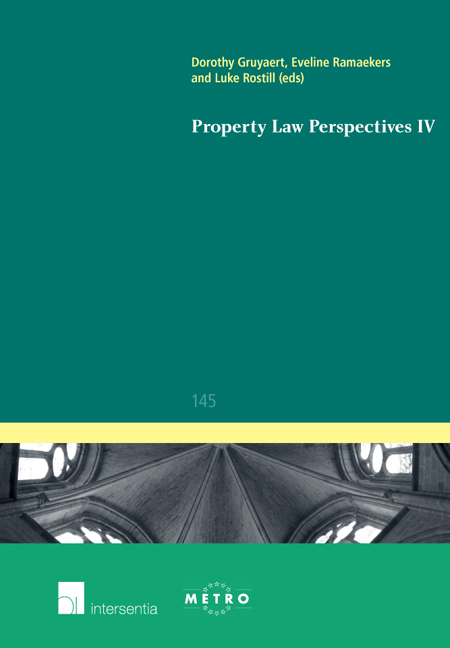Book contents
- Frontmatter
- Preface
- Contents
- Retention of Title v. Immovable Incorporation
- (Alternatives to) the Sale of Churches
- The First in Time Rule in Historical Context
- Paul Krugerbrug Revisited: State Action with an Excessive Impact on Property Rights from a Comparative Perspective
- The Reappearance of Ownership as a Means of Security in Mexican and French Law, the Battles Between Legal Technique and Legal Policy in Insolvency Law
- On the Unity or Disunity of Acquisitive and Extinctive Prescription. Or How Daring Reinterpretations are not Always Right
- Ius Commune Europaeum
(Alternatives to) the Sale of Churches
Published online by Cambridge University Press: 21 September 2018
- Frontmatter
- Preface
- Contents
- Retention of Title v. Immovable Incorporation
- (Alternatives to) the Sale of Churches
- The First in Time Rule in Historical Context
- Paul Krugerbrug Revisited: State Action with an Excessive Impact on Property Rights from a Comparative Perspective
- The Reappearance of Ownership as a Means of Security in Mexican and French Law, the Battles Between Legal Technique and Legal Policy in Insolvency Law
- On the Unity or Disunity of Acquisitive and Extinctive Prescription. Or How Daring Reinterpretations are not Always Right
- Ius Commune Europaeum
Summary
Introduction
For some time now, the problem of unoccupied churches has been high on the political agenda. Authorities all over Europe ring the alarm bell: the decline in church attendance makes it hard to bear the costs of maintenance, heating and restoration of the churches. Demolishing a church, however, can only be a last resort, considering the emotional value that is coupled with the building. Selling the building remains often the only, but also a quite radical solution: it means the end of using the building for the goal it was established for. Therefore, when confronted with a church that is no longer frequented, the following questions arise: how can we balance, on the one hand, the use of the church for religious worship and, on the other hand, other uses of the church that yield more income? And, if a church is to be sold, how can the seller be protected against uses of the church that would be contrary to the religious character of the building?
Property law can offer an answer to the abovementioned questions. In this paper, we will first consider whether a church can count as a public land good or not. Next, we deal with alternatives to the sale of a church through the establishment of rights of long lease, usufruct and superficies. Finally, we will consider, when a church nevertheless would be sold, what clause can adapt a sale to its specific subject, that is a church. However, this paper focuses on the Property law-related questions on the topic in Belgian law, with some comparison with French and Dutch law, but omits the questions related to canon, administrative and tax law.
Preceding determination: the church as public land good
First and foremost, we have to verify whether a given church can count as public land. Public land goods are those goods that are meant for everyone's use by virtue of their nature or a decision of the government, or that are included in the public land through an act.
- Type
- Chapter
- Information
- Property Law Perspectives IV , pp. 19 - 40Publisher: IntersentiaPrint publication year: 2016

